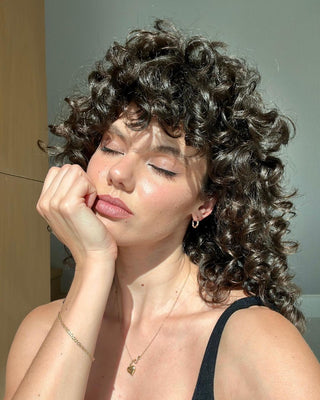Water is an essential part of any haircare routine. We drench our hair in it on wash days and even sometimes spray a little bit on the hair for moisture all in a bid to maintain healthy curls. But did you know using the wrong kind of water can dry out your curls? That's right, not all water is the same and sometimes the water coming out of your shower head might be the type that makes your hair brittle and dry, AKA, hard water. Hard water can cause more problems for your hair than you realise and if have been dealing with lacklustre and brittle hair, it might just be the main culprit.
Don't know what hard water is? Fret not, in this article we'll be revealing all there is to know about it. Plus, we'll be talking about how to prevent hard water damage on your hair.
What Is Hard Water And How Does It Affect Your Hair?
Now, if you've always categorised water as simply just clean or dirty, the term hard water may leave you feeling confused. Well, water is considered “hard” when it contains high traces of minerals like calcium, magnesium, lead, copper, and iron. Once on your hair, these minerals can build up and cause a host of problems. How do these minerals find their way into your water in the first place? Well, when water makes its way through rivers, rocks, soil, and finally into your water pipes, it tends to pick up a few things like these minerals along the way.
Now, although these minerals are not inherently bad for your body internally, they have a different effect on the hair. Hard water has a very alkaline PH which can cause a lot of changes to your hair. It can also affect how your hair interacts with any product you apply to it. So, if you notice your hair products are not giving you your desired results, sometimes it may be the hard water in your showerhead that's stopping them from working properly.
Hard water is a very common and naturally occurring phenomenon so, many people have it in their homes. However, the only way to be sure if you have hard water is to call the water department in your area and ask them. Hard water also tends to leave a residue on metal so check your sink, showerhead or faucets for traces of white build-up if you want to know if you have hard water.
Effects Of Hard Water On Curly Hair
Dryness
One of the biggest impacts of hard water on your hair will be extreme dryness. As we all know, curly hair is naturally prone to being dry but when you have hard water, your cuticles become lifted, and your hair loses moisture faster than you can keep up. The mineral buildup will also create a barrier, making it hard for any moisture to get into your hair. So, you will notice that no matter how much you spray your hair with water or apply a moisturiser, it still always feels brittle and dry.
Increase Frizz
When your hair is dry and your cuticles are lifted, it is automatically going to become increasingly frizzy and rough. This means your hair will not be able to hold any hairstyle for long– your curls will lose definition very quickly and will lack the elasticity required to hold their natural shape.
Breakage
Hard water increases friction between your hair strands which can cause an increase in the amount of tangles and knots you get. Over time, the hair will start to accumulate split ends and breakage. It should also be noted that the drier your curls, the greater the chances of them snapping off at different points when you try to style or detangle.
Dry Scalp
Excess build-up of minerals on your scalp can clog your follicles and block the natural sebum in your scalp from being properly distributed. As a result, your scalp will become dry and itchy.

How To Prevent Hard Water Damage On Your Curly Hair
1. Get a Water Filter
One of the best ways to stop the minerals in hard water from even getting to your hair is to get a water filter for your showerhead. This will help purify the water and ensure all the minerals get filtered out before they ever get the chance to touch your hair and scalp. Filters come in a wide range of sizes with filtration systems so, try to invest in a good quality filter for the best results. You will also need to clean your filter every few months to keep it in the best working condition.
If you want to address the root cause of the problem, you can also install a water softener to combat hard water in the water system of your entire house. This option requires a little more professional attention so only try this if you don't mind the cost of calling a plumber.
2. Do A Final Rinse With Distilled Water
If you cannot do anything about the quality of water coming out of your showerhead, then the next best solution is to finish off your wash days with a distilled water rinse. Distilled water has been properly treated and contains no traces of any unwanted minerals, so you can use it as a final step to rinse off the hard water deposits from your shower. To do this, after cleansing with a gentle shampoo like our Hydration Shampoo with Manuka Honey, rinse as usual and follow up with our Moisture-rich Conditioner. Then after rinsing your hair off all the products, simply grab a large bottle of distilled water and pour it over your hair as a final rinse. Be sure to cover the entire hair evenly.
3. Always Follow Up Every Wash With A Leave-In
After washing your hair, it is very important to apply a generous amount of a leave-in conditioner like Sofn'free's Manuka Honey Leave-in Conditioner. This will provide immediate relief for your curls by replenishing them with additional moisture, smoothness and shine. Just make sure to dry off any excess water on your hair with a microfiber towel before applying the product to get the best results and prevent any of that hard water residue from affecting its efficacy.

4. Use A Hair Mask Regularly
Incorporating a deep conditioning hair mask into your routine is another great way to tackle the effects of hard water on your curls. Something like our Manuka Honey and Avocado Hair Mask will help replenish your hair with moisture and prevent any dryness. It will also smoothen and strengthen your strands while minimising any chance of breakage. These are all things you want for your hair if it is being exposed in any way to minerals in hard water. It is best to deep condition weekly or bi-weekly but if you have a busy schedule, then try to give your hair this special treatment at least once a month.
5. Do A Hot Oil Pre-Poo
An oil treatment, especially a hot oil pre-poo can help offset the effects of hard water on your hair. As the name implies, this treatment is done by applying warm or mildly hot oil to the hair and scalp before shampooing. This hot oil pre-poo will penetrate your hair shaft to deliver extra moisture and nourishment that will prevent the dryness and dullness that often comes with hard water. It will also lubricate your curls and make them much easier to detangle while increasing shine and softness.
To do a hot oil treatment, grab a quarter cup of our Manuka Honey Hair & Scalp oil and put it in a small bowl. Then pour some hot water into a larger bowl and place the oil container inside the hot water bowl. Cover the bowl with a towel for about ten minutes until the oil becomes warm. Apply the oil evenly over your hair and scalp and cover your hair with a shower cap for 25-40 minutes. Then proceed to rinse out the oil and wash your hair as usual.
6. Oil Your Hair And Scalp
If the idea of a hot oil pre-poo sounds too time-consuming for you then, you can still use hair oiling as a means to combat the effects of water on your hair. Just use it as a final step in your moisturise or styling routine. You can apply our Hair & Scalp Oil to your curls after moisturising your hair to seal the moisture and prevent dryness and frizz. You can also apply our Strengthening Oil to your scalp to infuse it with the nourishment and moisture needed to tackle itchiness and irritation.
Hard water is a common cause of many hair problems and since most people never think too much about it, it can leave your curls exposed to years of dryness and damage. However, now that you understand the effects of this conundrum, you can be proactive and follow the steps we have highlighted to combat the negative effects of hard water and maintain the health of your curls.

